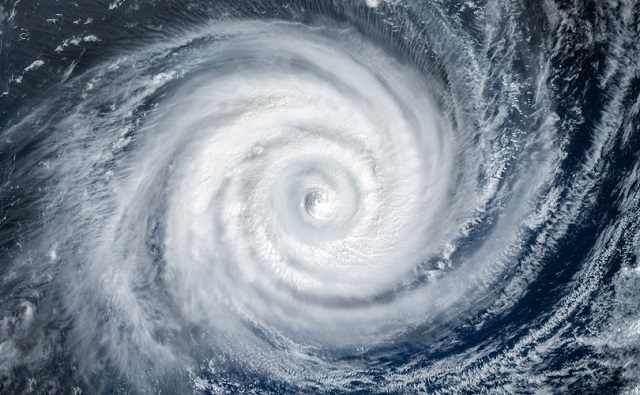International
There’s no scientific evidence of ‘human-induced climate change’ causing stronger hurricanes

From LifeSiteNews
The scientific consensus on hurricanes, which isn’t covered by breathless climate reporting, is that humans have had no detectable impact on hurricanes over the past century. We must demand honesty and contextual complexity on climate reporting.
As Hurricane Beryl barreled its way across the Gulf of Mexico and into the U.S. mainland, the attention-getting headlines had beaten it there by a long shot – claims that it was a remarkable outlier were appearing in climate-frantic narratives more than a week earlier.
CBS News claimed it was “historic,” alongside headlines on “How to talk to your kids about climate anxiety.” The BBC reported that it was “the first hurricane to reach the category four level in June since NHC [National Hurricane Center] records began and the earliest to hit category five – the highest category – in July.” While technically true, and warranting some mention, the claims tend to misrepresent, by implication and association, the current scientific understanding of hurricanes and human impacts on climate change.
The scientific consensus on hurricanes, a consensus not covered by breathless reporting on climate, is that humans have had no detectable impact on hurricanes over the past century. The National Climate Assessment published by the U.S. Global Change Research Program, for instance, in Appendix 3 reads:
There has been no significant trend in the global number of tropical cyclones nor has any trend been identified in the number of US land-falling hurricanes.
So what’s actually going on? Is Beryl’s historic early arrival an indication of something fundamentally different about hurricane activity? Does it or does it not represent the bitter fruit of humanity’s ecological sins? The answer is almost certainly not. Rather, the hype around Beryl’s early arrival represents a major misunderstanding, a mass-bias phenomenon which sees evidence where evidence doesn’t really exist.
Historically speaking, of course, hurricanes are commonplace in the Gulf. “Hurricane” derives from the prehistoric Taíno name for the god of evil winds, Jurucán. The Spanish quickly adopted the name to describe the violent storms which wreaked such havoc on their exploratory efforts in the New World. Both the 1527 Narváez and 1539 De Soto expeditions, for example, were pummeled by hurricanes that may well have reached category five, had the NHC been around to classify them as such. So while it is conceivable that Beryl is a major anomaly and portent of evil tidings, it is very unlikely to be.
Instead, its media portrayal as Exhibit A in the case for anthropogenic climate change is fundamentally inaccurate. Today’s dire headlines are a perfect example of what Steve Koonin, in his book Unsettled, calls “the long game of telephone that starts with the research literature and runs through the [scientific] assessment reports to the summaries of the assessment reports and on to the media coverage.”
The media, he says, often end up distributing a narrative that is directly counter to the actual evidence. They do this partly from misunderstanding the scientific and statistical significance of observations, but mostly because extreme headlines fit a generally understood narrative. Such reports are far more likely to be recognized and absorbed by the news-reading public. This selective attention pushes a bias toward extremism in climate reporting that significantly inflames the political climate, to our collective detriment.
Not widely reported, for instance, are counter-narrative facts such as that since 2011, major hurricane counts have dropped below their 170-year average. Or the fact that the Great Barrier Reef, once a poster-child of climate doom, has now hit record levels of coral cover. It doesn’t take a great deal of imagination to picture what the headlines would read if these positive facts were reversed: “Major Hurricanes: Highest Number in Centuries!” or “Barrier Reef Records Lowest Coverage in Recorded History.” These are headlines we can easily envision, but have not seen, because they are entirely backward.
Instead, what happens is that reports which are technically true (like Beryl’s record early arrival) make it into the common current only if they fit the general alarmist narrative. The BBC perfectly exemplifies this in its coverage, noting that “Hurricane Beryl’s record-breaking nature has put the role of climate change in the spotlight.” It then goes on to say, toward the end of an article most people will never fully read:
The causes of individual storms are complex, making it difficult to fully attribute specific cases to climate change. But exceptionally high sea surface temperatures are seen as a key reason why Hurricane Beryl has been so powerful.
This is how the slight-of-hand works: BBC reporters, no doubt in interviews with hurricane experts, were obliged to quibble somewhat about the implications of Beryl’s record-setting classification. They properly note that it is “difficult” (impossible, in fact) to attribute Beryl’s record to climate change as such. And they are correct that high sea surface temperatures are a major factor in Beryl’s extraordinary rise. But it is the way these technical truths are presented that leads to errors in association. Very few casual readers would be likely to read the article, headlined with “How record-breaking Hurricane Beryl is a sign of a warming world” and not make an inductive leap to the causal inference of human-induced warming. This is a problem, because such an inference is in fact not substantiated by any scientifically accepted observations.
Now, to be sure, this works both ways. This is not a claim that human emissions have no impacts, after all, only that we must be very careful about what the evidence actually says before channeling it into policy recommendations. Nor is my point that we can safely disregard all negative reports about the environment, since there are clearly issues that warrant our genuine collective attention. For instance, I’ve played a bit of sleight-of-hand myself: I correctly noted that major hurricanes are below the historical average, but I did not highlight the fact that overall hurricane count is up. Likewise with the Great Barrier Reef: while coral coverage is remarkably up, the kind of monoculture coral crop accounting for the rise still leaves room for ecological concern.
The real point is that we must demand honesty, including contextual complexity, on climate reporting. Especially since the stakes are so high (either in matters of our environment or individual liberty), we cannot afford to play games with half-truths and obfuscations. Intelligent free people deserve fuller, more comprehensive, less-activist reporting on climate change. Beryl has made a record of sorts, yes. What that record really means in the context of human-induced climate change is fundamentally, scientifically unknown. Maybe that would be a better headline.
Reprinted with permission from the American Institute for Economic Research.
Censorship Industrial Complex
Welcome to Britain, Where Critical WhatsApp Messages Are a Police Matter

By
“It was just unfathomable to me that things had escalated to this degree,”
“We’d never used abusive or threatening language, even in private.”
|
You’d think that in Britain, the worst thing that could happen to you after sending a few critical WhatsApp messages would be a passive-aggressive reply or, at most, a snooty whisper campaign. What you probably wouldn’t expect is to have six police officers show up on your doorstep like they’re hunting down a cartel. But that’s precisely what happened to Maxie Allen and Rosalind Levine — two parents whose great offense was asking some mildly inconvenient questions about how their daughter’s school planned to replace its retiring principal.
This is not an episode of Black Mirror. This is Borehamwood, Hertfordshire, 2025. And the parents in question—Maxie Allen, a Times Radio producer, and Rosalind Levine, 46, a mother of two—had the gall to inquire, via WhatsApp no less, whether Cowley Hill Primary School was being entirely above board in appointing a new principal.
What happened next should make everyone in Britain pause and consider just how overreaching their government has become. Because in the time it takes to send a meme about the school’s bake sale, you too could be staring down the barrel of a “malicious communications” charge.
The trouble started in May, shortly after the school’s principal retired. Instead of the usual round of polite emails, clumsy PowerPoints, and dreary Q&A sessions, there was… silence. Maxie Allen, who had once served as a school governor—so presumably knows his way around a budget meeting—asked the unthinkable: when was the recruitment process going to be opened up?
A fair question, right? Not in Borehamwood, apparently. The school responded not with answers, but with a sort of preemptive nuclear strike.
Jackie Spriggs, the chair of governors, issued a public warning about “inflammatory and defamatory” social media posts and hinted at disciplinary action for those who dared to cause “disharmony.” One imagines this word being uttered in the tone of a Bond villain stroking a white cat.
|
 |
Parents Allen and Levine were questioned by police over their WhatsApp messages. |
|
For the crime of “casting aspersions,” Allen and Levine were promptly banned from the school premises. That meant no parents’ evening, no Christmas concert, no chance to speak face-to-face about the specific needs of their daughter Sascha, who—just to add to the bleakness of it all—has epilepsy and is registered disabled.
So what do you do when the school shuts its doors in your face? You send emails. Lots of them. You try to get answers. And if that fails, you might—just might—vent a little on WhatsApp.
But apparently, that was enough to earn the label of harassers. Not in the figurative, overly sensitive, “Karen’s upset again” sense. No, this was the actual, legal, possibly-prison kind of harassment.
Then came January 29. Rosalind was at home sorting toys for charity—presumably a heinous act in today’s climate—when she opened the door to what can only be described as a low-budget reboot of Line of Duty. Six officers. Two cars. A van. All to arrest two middle-aged parents whose biggest vice appears to be stubborn curiosity.
“I saw six police officers standing there,” she said. “My first thought was that Sascha was dead.”
Instead, it was the prelude to an 11-hour ordeal in a police cell. Eleven hours. That’s enough time to commit actual crimes, be tried, be sentenced, and still get home in time for MasterChef.
Allen called the experience “dystopian,” and, for once, the word isn’t hyperbole. “It was just unfathomable to me that things had escalated to this degree,” he said. “We’d never used abusive or threatening language, even in private.”
Worse still, they were never even told which communications were being investigated. It’s like being detained by police for “vibes.”
One of the many delightful ironies here is that the school accused them of causing a “nuisance on school property,” despite the fact that neither of them had set foot on said property in six months.
Now, in the school’s defense—such as it is—they claim they went to the police because the sheer volume of correspondence and social media posts had become “upsetting.” Which raises an important question: when did being “upsetting” become a police matter?
What we’re witnessing is not a breakdown in communication, but a full-blown bureaucratic tantrum. Instead of engaging with concerned parents, Cowley Hill’s leadership took the nuclear option: drag them out in cuffs and let the police deal with it.
Hertfordshire Constabulary, apparently mistaking Borehamwood for Basra, decided this was a perfectly normal use of resources. “The number of officers was necessary,” said a spokesman, “to secure electronic devices and care for children at the address.”
Right. Nothing says “childcare” like watching your mom get led away in handcuffs while your toddler hides in the corner, traumatized.
After five weeks—five weeks of real police time, in a country where burglaries are basically a form of inheritance transfer—the whole thing was quietly dropped. Insufficient evidence. No charges. Not even a slap on the wrist.
So here we are. A story about a couple who dared to question how a public school was run, and ended up locked in a cell, banned from the school play, and smeared with criminal accusations for trying to advocate for their disabled child.
This is Britain in 2025. A place where public institutions behave like paranoid cults and the police are deployed like private security firms for anyone with a bruised ego. All while the rest of the population is left wondering how many other WhatsApp groups are one message away from a dawn raid.
Because if this is what happens when you ask a few inconvenient questions, what’s next? Fingerprinting people for liking the wrong Facebook post? Tactical units sent in for sarcastic TripAdvisor reviews?
It’s a warning. Ask the wrong question, speak out of turn, and you too may get a visit from half the local police force.
|
|
|
|
Reclaim The Net values your free speech and privacy. Each issue we publish is a commitment to defend these critical rights, providing insights and actionable information to protect and promote liberty in the digital age.
Despite our wide readership, less than 0.2% of our readers contribute financially. With your support, we can do more than just continue; we can amplify voices that are often suppressed and spread the word about the urgent issues of censorship and surveillance. Consider making a modest donation — just $5, or whatever amount you can afford. Your contribution will empower us to reach more people, educate them about these pressing issues, and engage them in our collective cause. Thank you for considering a contribution. Each donation not only supports our operations but also strengthens our efforts to challenge injustices and advocate for those who cannot speak out. Thank you.
|
Business
Cuba has lost 24% of it’s population to emigration in the last 4 years

 MxM News
MxM News
Quick Hit:
A new study finds Cuba has lost nearly a quarter of its population since 2020, driven by economic collapse and a mass emigration wave unseen outside of war zones. The country’s population now stands at just over 8 million, down from nearly 10 million.
Key Details:
- Independent study estimates Cuba’s population at 8.02 million—down 24% in four years.
- Over 545,000 Cubans left the island in 2024 alone—double the official government figure.
- Demographer warns the crisis mirrors depopulation seen only in wartime, calling it a “systemic collapse.”
Diving Deeper:
Cuba is undergoing a staggering demographic collapse, losing nearly one in four residents over the past four years, according to a new study by economist and demographer Juan Carlos Albizu-Campos. The report estimates that by the end of 2024, Cuba’s population will stand at just over 8 million people—down from nearly 10 million—a 24% drop that Albizu-Campos says is comparable only to what is seen in war-torn nations.
The study, accessed by the Spanish news agency EFE, points to mass emigration as the primary driver. In 2024 alone, 545,011 Cubans are believed to have left the island. That number is more than double what the regime officially acknowledges, as Cuba’s government only counts those heading to the United States, ignoring large flows to destinations like Mexico, Spain, Serbia, and Uruguay.
Albizu-Campos describes the trend as “demographic emptying,” driven by what he calls a “quasi-permanent polycrisis” in Cuba—an interwoven web of political repression, economic freefall, and social decay. For years, Cubans have faced food and medicine shortages, blackout-plagued days, fuel scarcity, soaring inflation, and a broken currency system. The result has been not just migration, but a desperate stampede for the exits.
Yet, the regime continues to minimize the damage. Official figures from the National Office of Statistics and Information (ONEI) put Cuba’s population at just over 10 million in 2023. However, even those numbers acknowledge a shrinking population and the lowest birth rate in decades—confirming the crisis, if not its full scale.
Cuba hasn’t held a census since 2012. The last scheduled one in 2022 has been repeatedly delayed, allegedly due to lack of resources. Experts doubt that any new attempt will be transparent or complete.
Albizu-Campos warns that the government’s refusal to confront the reality of the collapse is obstructing any chance at solutions. More than just a demographic issue, the study describes Cuba’s situation as a “systemic crisis.”
“Havana (Cuba, February 2023)” by Bruno Rijsman licensed under CC BY-SA 2.0 DEED.
-

 Uncategorized16 hours ago
Uncategorized16 hours agoPoilievre on 2025 Election Interference – Carney sill hasn’t fired Liberal MP in Chinese election interference scandal
-

 Business1 day ago
Business1 day agoCuba has lost 24% of it’s population to emigration in the last 4 years
-

 2025 Federal Election2 days ago
2025 Federal Election2 days agoCanadian Banks Tied to Chinese Fentanyl Laundering Risk U.S. Treasury Sanctions After Cartel Terror Designation
-

 Automotive2 days ago
Automotive2 days agoTrump warns U.S. automakers: Do not raise prices in response to tariffs
-

 Business2 days ago
Business2 days agoTariff-driven increase of U.S. manufacturing investment would face dearth of workers
-

 International1 day ago
International1 day agoTrump signs executive order to make Washington D.C. “safe and beautiful”
-

 2025 Federal Election17 hours ago
2025 Federal Election17 hours ago2025 Election Interference – CCP Bounty on Conservative Candidate – Carney Says Nothing
-

 2025 Federal Election17 hours ago
2025 Federal Election17 hours ago2025 Federal Election Interference from China! Carney Pressed to Remove Liberal MP Over CCP Bounty Remark






